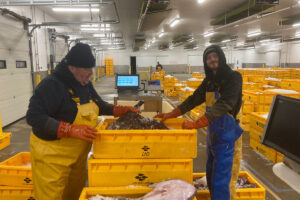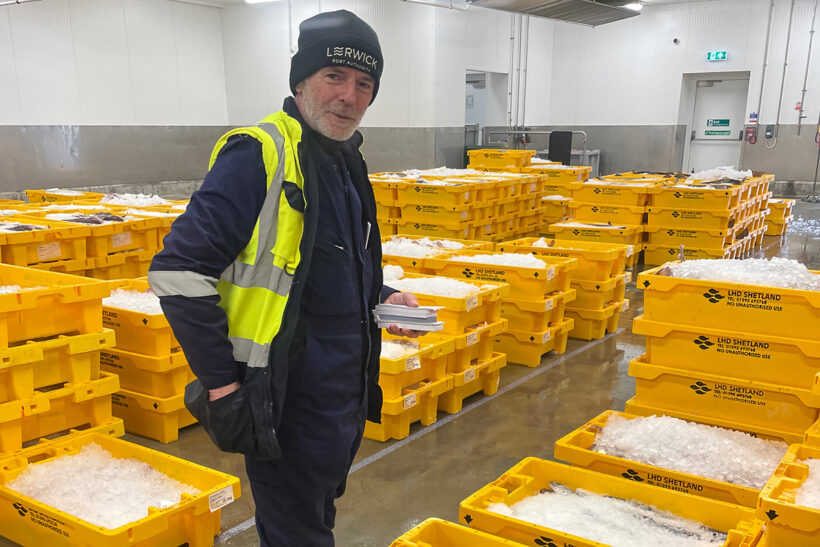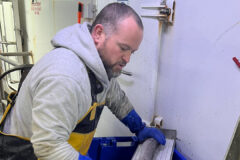Share a day in the life of Shetland Seafood Auctions’ senior operations manager
Gordon Drummond started working for Shetland Seafood Auctions (SSA) in 2016, after being approached by auction manager Martin Leyland. He has since gone on to become senior operations manager, playing a crucial role in the development of the onshore services provided by SSA. These not only enable the efficient running of the island’s fishmarkets, but also help to attract more visiting vessels.
“I brought Gordon in on a project role,” explained Martin. “He was doing some work with the mussel industry at the time. I had a part-time role for somebody that knew about grading machines. I had just purchased one on a trial, and Gordon came in to manage that.
“Things had moved on by 2018 because we knew we were moving into the two new fishmarkets in Lerwick and Scalloway, so I asked Gordon if he would stay on and help me set up an interim facility in Scalloway.
“Lerwick was easy, as they were building the new fishmarket on a different site to the old one, but in Scalloway they were knocking the old market down and rebuilding it on the existing site.
“Gordon saw this as an opportunity to offer electric pallet barrow services to aid the unloading efficiency from quayside to warehouse. It was an interesting 18-month project following the installation of refrigeration inside the temporary facility.”

Gordon using one of SSA’s zero-emissions electronic pallet trucks to unload from Courageous LK 470. The process is just one of the new onshore services that Gordon helped to develop. Designed initially for the interim fishmarket whilst the construction of the new building in Scalloway was taking place, the process worked so well that it has been adopted at the new Lerwick and Scalloway fishmarkets. “The new markets are probably twice as wide as the old market, so it’s a bit far to be dragging boxes,” said Gordon.
Shetland Seafood Auctions, which celebrates its 25th anniversary in November, acts collaboratively with local industry players to ensure that the island’s fisheries industry remains sustainable. Key to that aim is running the fishmarkets as effectively and efficiently as possible, and once the new Lerwick and Scalloway markets opened, Gordon’s position was developed into the senior operations role.
It’s a job that sees him get involved with all manner of tasks to enable the smooth running of the business’ operational plan, which includes ensuring boats are met on time to unload their catch, weighing, grading, the creation of the auction catalogue, the facilitation of the auction, and post-sales activities.
Gordon’s day normally begins at 8am, with labelling during the morning’s sale. “I jump in for colleagues who carry out the tallying in the morning. When the auction’s running, as each box or batch of boxes is sold, the information is sent to a printer. We go round and allocate the labels to the boxes that have been bought by each buyer,” he said.
Once the auction – which is conducted by agent LHD using the electronic Kosmos clock system from Aucxis – is finished, all the boxes have been labelled, and buyers are removing their purchases from the market, Gordon begins constructing the operational plan for the day.
That plan includes boat arrival times, the quantity of boxes to be landed, any grading requests from the boats, and the sample weighing required. Once compiled, the plan is then discussed and co-ordinated with the operational team.

Gordon’s knowledge and expertise has helped SSA become a data-driven operation. Martin Leyland of SSA said: “One of the things we’re doing is net-weighing all the boxes that we sample-weigh. The fish is transferred out of its original box into an empty box which has been iced and set to ‘tare’ at 0kg. When the fish is put into that box, you’re getting the actual weight of the fish.”
“We’ve got Lerwick and Scalloway markets, but we’ve also got two ports, one on the west side at West Burrafirth and one up north at Cullivoe, where the boats can land,” said Gordon. “The fish is then trucked down to whichever market it’s decided it’s going to. So it’s not just boats landing direct into the market.”
Gordon’s plan is also crucial to the effective running of the night shift team, and he has played a key role in embracing technology and data-driven practices to help increase working efficiency while sample- weighing and grading boxes of fish.
Another use of technology comes in the form of WhatsApp messaging groups, which are used to maintain clear, concise communication between boats and auction agents, and to help with the rostering of staff.
Martin Leyland says Gordon’s knowledge and expertise in technology is vital for Shetland Seafood Auctions. “We will get a WhatsApp message from the night shift team saying that this printer is not working, this scale isn’t working, this tablet’s not doing this, there’s a problem with the pallet truck – all of those kind of things he has to deal with the following day, so we’re back fully equipped as quickly as possible.”
But even in this data-driven, efficient operation, the one thing technology can’t guarantee is a good catch, as Gordon pointed out. “There was a boat that landed at 1am this morning, and we called out a pallet van driver – and he had 63 boxes, which is very little. So you never know what’s coming in until you’re actually there on site.
“We’re dealing with 23 local individual businesses just now in the boats themselves, and then we’ve got a lot of other, separate businesses that we’re dealing with at the same time. Every business is demanding of its own unique needs.
“We can’t control when the boats are coming in, or how many boxes are coming in – we just have to provide as good a service as we can to enable the industry to function.”
Although Gordon’s knowledge, expertise and experience is instrumental to the continued good service of which he, and Martin, speak very proudly, he is, like so many in our industry, keen for others to share the credit.
“It’s a very good team here,” he said. “I enjoy working with the people that I’m working with.”
This story was taken from the latest issue of Fishing News. For more up-to-date and in-depth reports on the UK and Irish commercial fishing sector, subscribe to Fishing News here or buy the latest single issue for just £3.30 here.
Sign up to Fishing News’ FREE e-newsletter here.






